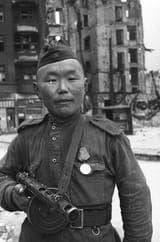Search Results
7/7/2025, 3:42:03 AM
The Legacy of Soviet Mongol rape in Germany
https://www.atlanticcouncil.org/content-series/thinking-global/berlin-1961-the-legacy-of-soviet-rape-in-germany/
May 8, 2011
Berlin 1961: The Legacy of Soviet Rape in Germany
By Frederick Kempe
Berlin 1961: The Legacy of Soviet Rape in Germany
Berlin 1961 Frederick Kempe
I first visited four of my elderly East German aunts as a college student in the late 1970s, they were willing to discuss almost anything except the final days of World War II and the first days of Soviet military occupation. Only over time and in whispers, did one of my aunt’s share the story. She and her sisters, she said, had each suffered either rape or some other sexual abuse at the hands of troops that history recorded as their liberators and allies.
So when I began to reconstruct the atmosphere of Berlin in 1961, having chosen to illustrate it through vignettes of individuals throughout the book, I thought long about whether to include Marta Hiller’s own story of rape. Though the details were sensational, the story was sadly routine.
According to estimates extracted from hospital records, between 90,000 and 130,000 Berlin women had been raped during the last days of the war and the first days of Soviet rule – a soldiers’ expression of frustration and rage after a war in which some 20 million Soviets had died. Tens of thousands of others had fallen victim elsewhere in the Soviet zone. Hiller’s had expected her anonymously written book, “A Woman in Berlin,” to be welcomed after its publication in 1959 by a people who might want the world to know that they, too, had been the victims of war. Instead, Berliners responded either with hostility or silence.
https://www.atlanticcouncil.org/content-series/thinking-global/berlin-1961-the-legacy-of-soviet-rape-in-germany/
May 8, 2011
Berlin 1961: The Legacy of Soviet Rape in Germany
By Frederick Kempe
Berlin 1961: The Legacy of Soviet Rape in Germany
Berlin 1961 Frederick Kempe
I first visited four of my elderly East German aunts as a college student in the late 1970s, they were willing to discuss almost anything except the final days of World War II and the first days of Soviet military occupation. Only over time and in whispers, did one of my aunt’s share the story. She and her sisters, she said, had each suffered either rape or some other sexual abuse at the hands of troops that history recorded as their liberators and allies.
So when I began to reconstruct the atmosphere of Berlin in 1961, having chosen to illustrate it through vignettes of individuals throughout the book, I thought long about whether to include Marta Hiller’s own story of rape. Though the details were sensational, the story was sadly routine.
According to estimates extracted from hospital records, between 90,000 and 130,000 Berlin women had been raped during the last days of the war and the first days of Soviet rule – a soldiers’ expression of frustration and rage after a war in which some 20 million Soviets had died. Tens of thousands of others had fallen victim elsewhere in the Soviet zone. Hiller’s had expected her anonymously written book, “A Woman in Berlin,” to be welcomed after its publication in 1959 by a people who might want the world to know that they, too, had been the victims of war. Instead, Berliners responded either with hostility or silence.
6/15/2025, 6:54:05 PM
Page 1

